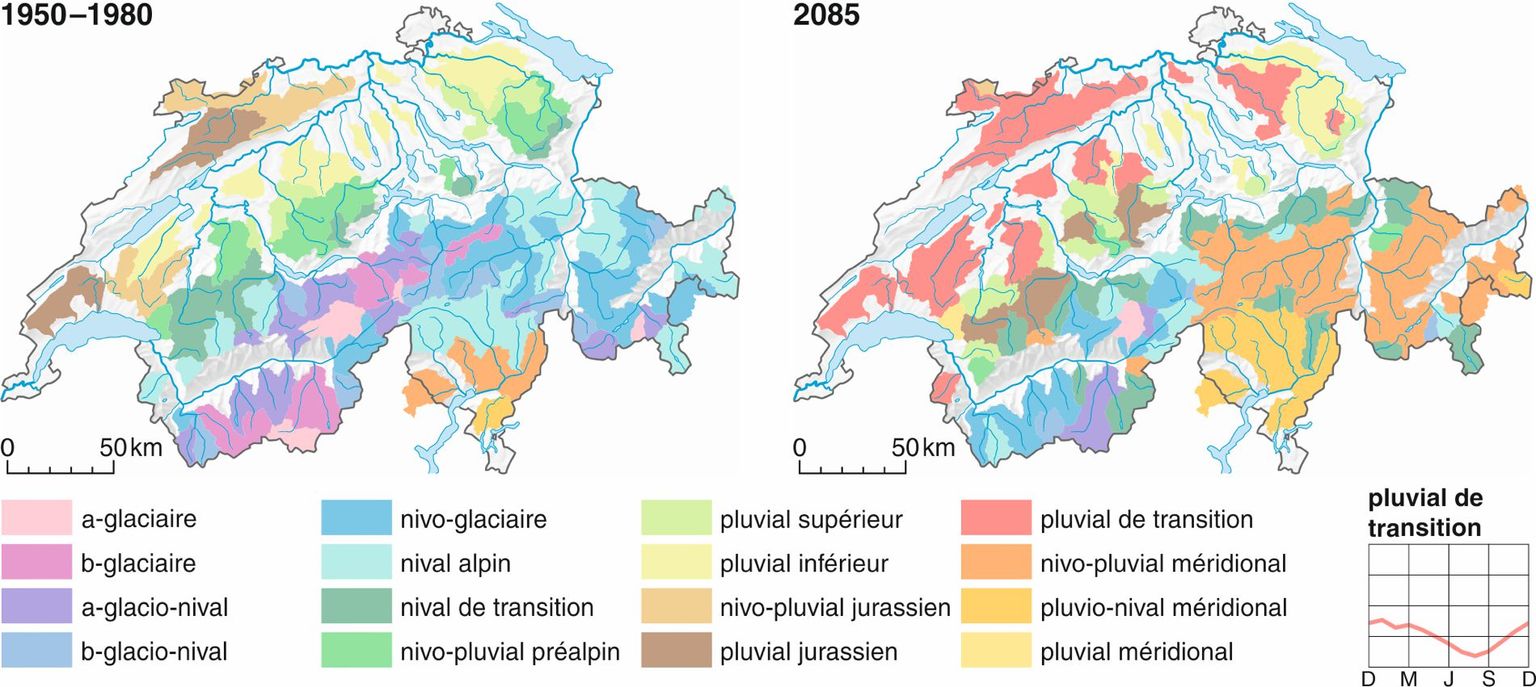Climate change and Hydrology
Während die Klimaerwärmung bereits messbar ist und sich die Modelle für zukünftige Temperaturentwicklungen einig sind, ist das Bild, wie sich der Klimawandel auf das Wasserdargebot auswirkt, weniger eindeutig. Über das Jahr gesehen wird die Niederschlagsmenge etwa gleich bleiben. Aber die Verteilung innerhalb des Jahres wird sich durchaus verändern. Die Broschüre «Klimazukunft Schweiz» aus dem Projekt Klima CH2025 kommt zum Schluss, dass die Sommer trockener, die Winter feuchter, die Starkniederschläge häufiger und heftiger und die Schneemenge weniger wird. Durch die ansteigenden Temperaturen steigt die Schneefallgrenze und auch die Eismassen nehmen stark ab.
Dies hat grosse Wirkungen auf die Hydrologie der Schweiz. Von Gletschern geprägte Abflussregimes werden fast vollständig verschwinden.

Weniger Schnee und Eis, mehr Starkniederschläge
Dadurch, dass weniger Niederschlag in Form von Schnee und Eis in den Einzugsgebieten gespeichert wird, fliesst mehr Wasser direkt nach Niederschlägen ab. Die Abflüsse im Winter nehmen also zu, die Schneeschmelze im Frühling tritt früher ein und wird weniger ausgeprägt. Auch im Sommer führen die Gewässer weniger Schmelzwasser und aufgrund der zusätzlich verminderten Sommerniederschlägen in Kombination mit höheren Temperaturen und verstärkter Verdunstung nehmen Probleme mit Niedrigwasser und Trockenheit zu.
Warme Luft kann mehr Wasser aufnehmen – und auch wieder abgeben. Dadurch werden mit der Klimaerwärmung auch die Sommergewitter intensiver. Während die Anzahl der Niederschlagsereignisse im Sommer abnimmt, nimmt die Stärke der einzelnen Ereignisse zu. Das führt zu mehr und intensiveren Hochwassern und Überschwemmungen, insbesondere da trockene Böden weniger Wasser aufnehmen können und somit mehr Wasser direkt während dem Ereignis abfliesst.
Grosse Auswirkungen
Die zunehmende Unregelmässigkeit der Abflüsse und die vermehrten Extremereignisse werden auch den Betrieben zu schaffen machen, die mit Wasser wirtschaften. Dazu gehören Stromproduzenten und die Rheinschifffahrt. Es werden aber noch sehr viel mehr Menschen in Europa diese Veränderungen zu spüren bekommen: In der Schweiz entspringen die grössten Ströme Europas (Rhein, Donau (Inn), Po (Ticino) und Rhone).
Referenzen und weiterführende Literatur
Januar 2026, Basil Stocker, auf Basis des Berichts Wasser in der Schweiz – ein Überblick


